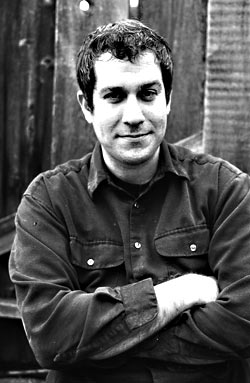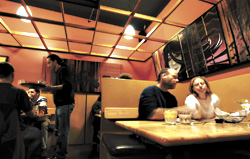If you’ve ever felt a swell of emotion overtake you while watching Friends, an exciting thrill during Pimp My Ride, or a twinge of hope during Progressive Insurance commercials, chances are the puppet master behind the music that’s tugging at your heartstrings could very well be Seattle composer Josh Myers. Since getting his start ferrying coffee at a California jingle house, he’s gone on to compose music for many a moving picture. But his scope of work goes above and beyond late nights behind the Wurlitzer. This man makes records and runs a music library and a music collective, all in the name of making musicians some scratch.
What drew you to this line of work?
My mom was a piano teacher, and my dad played guitar. They recognized the gift [of music] and nurtured it in me every step of the way. When I was 21, I made a decision to major in music composition and to actively pursue a career in film music.
How did you come to be a composer for film and television?
In 2001 I moved to Hollywood. A friend of mine put me in touch with a local jingle house. I went in for an interview and started that day as an unpaid intern. My duties included coffee and lunch runs, answering the phones, data entry, office admin, and limited tech support. Six months later, business picked up at the studio, and the owners found themselves unable to handle the workload. They decided to let me get my feet wet scoring to picture and assigned me some cues for a Saturday-morning stop-motion animated series called Phantom Investigators.
When you’re writing music for a particular project, how do you go about it?
Half the time, the client knows exactly what they want. When I have creative freedom, naturally, I take it more seriously. I’m a night owl, so I’ll usually start late and work until daylight. I always begin by messing around on my Wurlitzer while watching a scene over and over again. The first element I try to pin down is a rhythm that corresponds with the action on-screen. Next comes the harmonic groundwork and melodic ideas. Once that’s established, I’ll begin orchestrating. Then I’ll fine-tune the tempos and meter changes if the music needs to hit particular points. Quite often I’ll reach this stage and realize it’s not working at all, at which point I’ll have to start over completely or take a few steps back.
Which films or shows in particular have your creations been featured in?
To name a few—Friends, Nova, America’s Next Top Model, Jiminy Glick in La La Wood, Because of Winn-Dixie, Saved!, Top Design, American Inventor, The Benefactor, Newlyweds, Pimp My Ride. Advertisements include Progressive Insurance, Hot Wheels, Sprint, and Fox Sports.
You’re also the co-owner of a “music library” company?
The company is called Cinecue. We compile instrumental music from many contributors, including bands, artists, and composers. We then database, package, and distribute the music to hundreds of clients for licensing in cinema, broadcast, video, advertising, online, and interactive. Our agreement is totally artist-friendly. In fact, two of our top writers actually quit their day jobs when their ASCAP income outgrew that of their paychecks.
Do you ever hear things like, “I want to hear more Moby,” from advertising execs?
All the time. Working with producers who have a limited musical vocabulary is always a challenge. If they ask for more Moby, it’s up to me to determine what they really mean by that. Is it the beat they are referring to, a particular instrument in the mix, the vocal sample, the mood, or a specific melody they are hearing? If it’s a Moby song they want but simply can’t afford, it gets even trickier.
Tell us a bit about Burn the Stereo, your music collective.
Burn the Stereo is a group of friends I’ve networked together to quickly and confidently produce original music for advertising. Many of us hail from the rock/pop world, having played and recorded with the likes of Morrissey, Beck, Weezer, Smashing Pumpkins, Sufjan Stevens, Sunny Day Real Estate, Goo Goo Dolls, Jimmy Eat World, Garbage, and Five for Fighting. Connecting with audiences through music in 30 seconds or less is a difficult thing to do, but we feel that our collective repertoire equips us and positions us at the forefront of music and culture.
apecknold@seattleweekly.com
A weekly peek behind the curtain of the Emerald City music world, Behind the Scene sheds light on folks you won’t see onstage, but who make it all happen.






